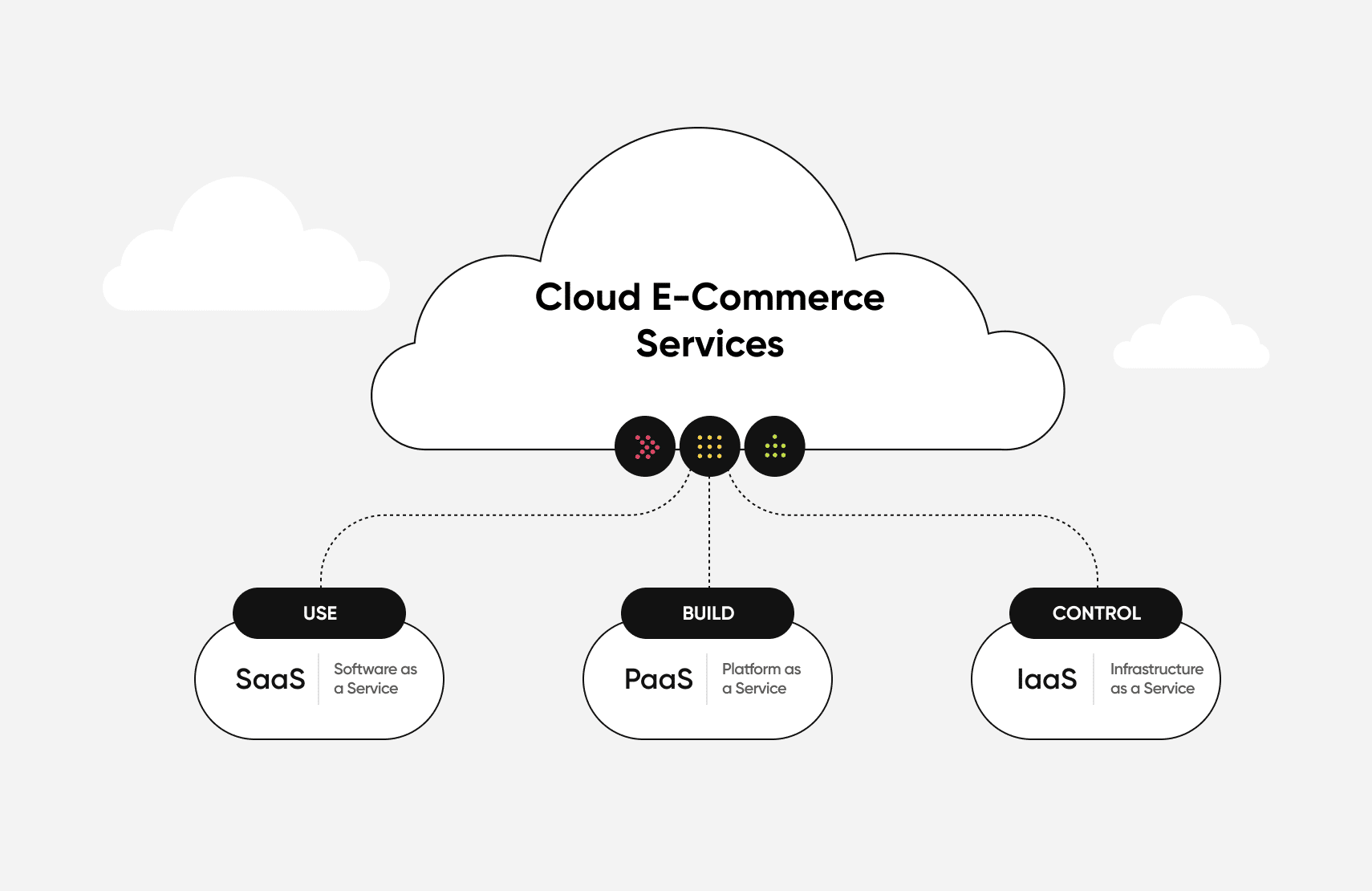What Is Cloud E-Commerce?

E-commerce is growing faster than ever, calling for physical and online retailers to adopt solutions to simplify, secure, and streamline digital transactions.
There are several cloud e-commerce services to choose from, including IaaS, PaaS, and SaaS, each with varying levels of resource requirements.
Using e-commerce services and platforms from e-commerce SaaS providers like fabric are ideal for retailers that want to focus on selling versus coding.
[toc-embed headline=”Cloud E-Commerce Definition”]
Cloud E-Commerce Definition
Cloud e-commerce uses cloud-based technology to manage and scale data storage, hosting, and digital commerce applications such as virtual payments, inventory management, and product information management.

[toc-embed headline=”Overview of Cloud E-Commerce”]
Overview of Cloud E-Commerce
Cloud e-commerce uses clusters of servers and other cloud-based systems from cloud vendors to handle high volumes of transactions and traffic to online sales channels. It’s a solution that digital retailers use to quickly adapt to growing demand, enhance security, simplify maintenance, and build or integrate new e-commerce applications on a whim.
Cloud e-commerce is often associated with cloud-based e-commerce platforms such as fabric, Shopify Plus, and Salesforce Commerce Cloud. E-commerce application programming interfaces (APIs) and microservices are also part of cloud e-commerce.
Before cloud-based e-commerce platforms and other solutions emerged, classic e-commerce platforms such as IBM WebSphere and Oracle ATG were prevalent in the 1990s and early 2000s. Unlike cloud-based e-commerce solutions, these “on-premise” e-commerce solutions required onsite server setups and costly ongoing maintenance.
Unlike older on-premise solutions, a cloud-based platform enables companies to outsource their IT infrastructure without investing in expensive on-premise equipment and maintenance. Plus, some software-as-a-service (SaaS) providers in the e-commerce space manage all aspects of the system, including the development of new application features.
[toc-embed headline=”Cloud-Based E-Commerce Solutions”]
Cloud-Based E-Commerce Solutions
In general, there are three available cloud-based solutions for e-commerce that allow retailers to manage customer data, product data, inventory data, website hosting, digital transactions, and many other e-commerce needs. In order of more involvement to less involvement on behalf of the retailer, these solutions include Infrastructure as a Service (IaaS), Platform as a Service (PaaS), Software as a Service (SaaS).
IaaS e-commerce solution
Infrastructure as a service (IaaS) is where you rent physical resources such as servers, databases, and networking gear to power an e-commerce architecture. You build or install e-commerce apps and services on top of them. Services can include custom-built PIMs, open source e-commerce platforms, and licensed e-commerce software from software providers that let you self-host.
IaaS vendors can provide some of the resource management such as virtualization, depending on the infrastructure service you select, but you’re responsible for managing the applications, data, runtime, middleware, and operating system that sit on top of the infrastructure. IaaS vendors include Amazon AWS, Microsoft Azure, and Digital Ocean.
IaaS is ideal for retailers that want to maintain as much control as possible over their technology stack without hosting e-commerce solutions on-premise.
PaaS e-commerce solution
Platform as a service (PaaS) is similar to IaaS but requires less infrastructure management. It offers developers a way to build their e-commerce applications using “infrastructure platforms” with pre-defined operating systems and processes that handle resource procurement, capacity planning, and patching.
Ultimately, PaaS allows you to focus less time on managing infrastructure code and more time developing application code to power features within your e-commerce application. For example, Google App Engine offers a PaaS environment for developers who want to build web applications without worrying about infrastructure.
PaaS is ideal for retailers that want to build their own e-commerce applications but are okay with handing off infrastructure-related elements of their technology stack.
Note: PaaS can include “serverless” technology where you simply upload your application code and pay for execution time. We use some of this “serverless” technology to power services inside our own e-commerce platform.
SaaS e-commerce solution
Software as a service (SaaS) providers include commerce technology companies like fabric that offer ready-to-use e-commerce services. These services include a complete e-commerce platform solution, distinct e-commerce applications such as PIM and OMS software, and e-commerce APIs.
SaaS providers handle infrastructure management as well as software management. You merely configure the software as you wish, following a “configuration versus code” paradigm. In general, e-commerce software purchased as a service will come with a user interface (UI) where these configurations can be made. Additionally, developers can work outside the UI with APIs to develop custom solutions without developing custom software.
SaaS is ideal for retailers that want to quickly scale and spend more time focusing on products and selling than e-commerce platform development.
[toc-embed headline=”Example of Cloud E-Commerce”]
Example of Cloud E-Commerce
Amazon Web Services (AWS) has more than 100 cloud computing services, including Elastic Beanstalk, its PaaS solution. With this setup, e-commerce sellers can quickly deploy and manage custom apps without learning or maintaining infrastructure. Also, they don’t need to know how to write infrastructure-related code as AWS handles all the heavy lifting.
For example, you can upload an application or two, and AWS will take care of capacity provisioning, scaling, load balancing, and app health monitoring. You can use various apps, including those developed in Node.js, Python, Java, Go, Ruby, and PHP. The lawn care retailer, Rachio, uses AWS Elastic Beanstalk to deploy and manage its e-commerce website, web apps, and API infrastructure.
In terms of SaaS, fabric takes a holistic yet service-based approach to providing commerce software, similar to how Amazon AWS does for infrastructure services. fabric provides all the services needed to power commerce and let retailers choose what they need without having to worry about infrastructure.
[toc-embed headline=”Cloud E-Commerce FAQs”]
Cloud E-Commerce FAQs
Why is cloud e-commerce a good fit for online businesses?
There are dozens of moving parts in an e-commerce business—web hosting, data storage, payment processing, and other digital services. Without cloud e-commerce, you’d have to pay for costly on-premise hardware and manage it all yourself. You’d also have to code the software that’s already offered by e-commerce software providers as a service (i.e. SaaS).
By adopting cloud-based e-commerce platforms, you can have better scalability, flexibility, security, cost efficiency, agility, and ease of use with your e-commerce solution. It’s a solution for businesses that want to outsource their IT needs while retaining full ownership over their data. It ensures maximum uptime, up-to-date code, and flexibility to customize your frontend using your own unique code or API integrations.

Content marketer @ fabric. Previously marketing @ KHON-TV and Paramount Pictures.